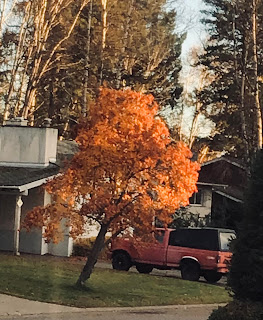autumn colours
We are headed into Thanksgiving (Canadian) soon, and the trees are beginning to wear their autumn splendour.
Living where I do (around the 54th parallel N) we have (or used to) have distinct seasons. Winter was frequently 'too long', but we had definite winter, spring, summer and autumn. The transitional stages between the seasons could be...interesting...like spring break up.
But things are changing. The seasons are less predictable now, and no one truly knows what the future holds in terms of climate. Will we fix the problem or keep swimming in De Nile until the damage is not repairable?
Given my age, I won't have to live with the consequences of our folly of denial for very long. That doesn't make me any less aware of the damage and harm that awaits us if we don't do *something* soon. And sooner, rather than later.
The problem is, it's not an easy fix. It isn't like the hole in the ozone layer - that was a pretty simple fix, and the world rallied and got it done. This is a multi-stage failure on so many levels, ignored for long enough that there may never be a fix back to 'normal', just a never ending dealing with trauma caused by one 'natural' disaster after another. Plus add active misinformation being amplified, and here we are.
The last report I heard about wildfires in Canada was somewhere around 17 million hectares of forest burned. (For my US friends a hectare is far larger than an acre.) (A hectare is nearly 2.5 acres.)
17 MILLION hectares. 17 MILLION hectares of wood, burned in Canada, releasing one of the largest single dumps of carbon into the air in a single wildfire season. Ever. (The Amazon forest may be worse, I haven't seen the numbers for it. I'm just focused on N. America at the minute.)
Will our purchase of a hybrid vehicle and a heat pump fix this problem? No. It won't. But at least we are doing what WE can to not contribute more to the problem.
Our furnace broke down last January during a cold snap of -30 C temps. We 'fixed' it but it has never felt entirely 'secure' so we thought it over and decided that if we were going to get a new heating system we had to look at a heat pump. Now most heat pumps don't work well at colder temps - one of the reasons we had hesitated for this long to even consider one - but we are going to go ahead and keep our natural gas furnace as an 'emergency' back up for those -20 C and lower, temps.
Because the world 'heating up' doesn't mean that we won't still get cold weather. It just means that weather is going to become more and more unstable and harder to predict.
Add to that our province is in a state of drought. Yes, the 'wet coast' province is in a state of drought. With mountain ranges that encourage any moisture in the air to drop, we are in an official state of drought.
If we think 2023 was bad, we may have more 'interesting' times coming in 2024. Especially given this winter is an El Nino year.
If you do nothing else, listen to the politicians. Ask them for their *solutions* to issues like climate change. Don't accept "It's the other guys fault" as a valid answer. Press for actual solutions. Find out the actual *planks* in their party platform and if all they have to offer is 'It's other guy's fault, get rid of him, elect me"? Don't. Don't elect them. They have nothing to offer. Or, as some say - all hat, no cattle.
Climate change isn't going to be fixed in a day and yes, there are pressing problems in so many other areas, but climate change is our future. If we want one that isn't going to continually get worse, we have to stop ignoring it and at least TRY to slow it down.
For us, we bought air filters not just because of covid but because of the increasing numbers of wildfires in our province. We have had almost continual 'smoke alert' days since MAY. The filter has been running on high more days this year than the previous two years combined.
As we head into winter the fires should go out. But we have no idea what is in store for us in the coming years. I suppose once the entire forest is burned down we'll at least have fewer wildfires?


No comments:
Post a Comment